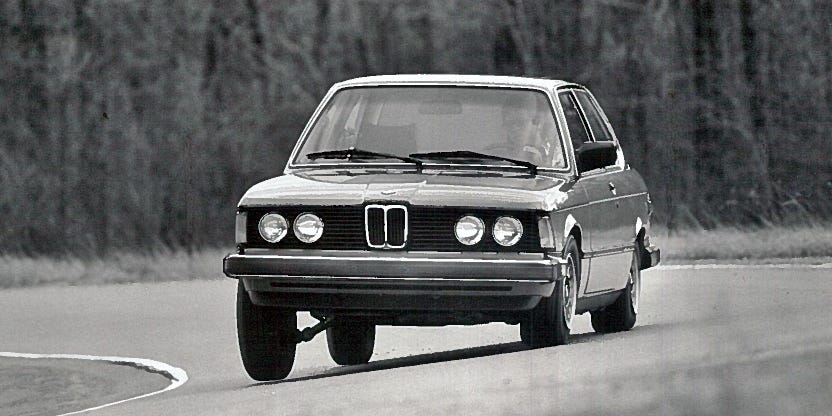Tested: 1980 BMW 320i Brings Responsible Fun

From the March 1980 issue of Car and Driver.
These days, every gallon of gas saved is a gallon earned. Unless you’ve been lost in a Peruvian rain forest for the last eighteen months, you know how tenuous our energy situation is. And that means every car has got to do its part.
Of course, for those of us who care about good cars, fuel-efficient rays of hope are already streaming through this cloudy scenario—and one of the brighter lights, we’re happy to report, is the new BMW 320i. Not only does this quintessential sports sedan provide all of the driving enjoyment of its forebears, but for 1980 it’s also become an energy-conscious solid citizen: this year it delivers 30 percent better fuel economy than ever before.
While more than a few reworked 1980 cars boast such an economy improvement, the BMW’s is truly noteworthy. Last year’s version, at 19 mpg, wasn’t exactly a gas hog, but the 1980 320i will travel an average of 25 miles for every gallon you pump into it. And in case you haven’t checked lately, that’s the mileage number you’ll find on the window sticker of a Volkswagen Rabbit. But there’s more to this success story than miserly mileage figures. More often than not, a change like this would be cause for a performance loss, the engineers having traded off horsepower or favorable gearing for better economy. But the most encouraging thing about the 320i is that its hearty performance wasn’t compromised by its new responsibility for saving fuel. In fact, in some areas it will even outrun last year’s car.
Aaron KileyCar and Driver
Its 60-mph time of 9.8 seconds is 0.2 second slower than before, but the new 320i pulls out an advantage of 0.6 second and almost 2 mph by the end of a quarter-mile. It will also reach 90 mph 4 seconds quicker than before—though its 105-mph top speed is off by 4 mph.
Those figures are all the more impressive when you realize that they were turned in by a car tuned to the freshly tightened 1980 exhaust-emissions standards—requirements that have squeezed the life out of more than a few engines this year.
Even BMW’s crack team of enthusiast-engineers had to work overtime to make all of this happen. In fact, things mechanical are actually so changed that the littlest BMW technically isn’t a 320i anymore. In Bimmerese the numbers on the rear deck lid have traditionally signified the body style and engine dis-placement—in this case meaning a 3-series coupe with a 2.0-liter engine. But no longer. For marketing reasons the model badge is unchanged, though the 320i is now powered by a downsized version of the famous fuel-injected, overhead-cam, hemi-head four-cylinder engine that displaces 1767cc. (In Europe this model is called a 318.) A mere 223cc reduction doesn’t sound like all that much, but when you’ve only got 1990 to start with, every little cubic centimeter counts.
Aaron KileyCar and Driver
BMW kept the horsepower loss down to 8 percent (9 hp) with the aid of a new emissions system built around a three-way catalytic converter and an oxygen sensor. Thanks to the way such advanced devices work, BMW was able to optimize fuel distribution, compression ratio, and timing for greater engine efficiency. The new emissions system is so thorough, it even meets the tighter 1980 California standards. So for the first time in years, West Coast Bimmer buyers suffer no performance penalty.
BMW’s trick for making fewer ponies pull harder was to multiply the available power with lower gearing. The final-drive ratio was dropped from 3.64:1 to 3.91, a change that would normally have turned the 320i into a buzzbox on the Interstate while hurting highway fuel economy. But BMW specified a Getrag five-speed transmission with a 0.81:1 overdrive top gear to drop the revs back into quieter, more economical territory for overland cruising.
Not only do these revisions do impressive things when pitted against the clocks, they work every bit as well as before in the real world. The new engine acts as if there were no such thing as emissions controls. It drives off after a cold start without so much as a hiccup, and, whether it’s warm or cold, its throttle response is among the most linear you’ll find anywhere. And in the first three gears it pulls cleanly to the 6800-rpm redline—which happens to be 400 revs more than were on tap last year.
Aaron KileyCar and Driver
The new five-speed gearbox is the perfect complement to the willing engine. The shift pattern puts fifth in the preferred spot, up and off to the right of the H, while reverse is nestled to the left of first and protected from errant downshifts by a strong lockout spring. The gear lever is connected to a Swiss movement of a linkage that responds to fingertip flicks. Its jeweled action and surgical accuracy invite you to play stick-shift concertos. The low final-drive ratio makes fifth a really usable gear, suitable for 45-mph trolling as well as highway work. And on the Interstate the engine’s characteristic droning doesn’t set in until about 75 mph, nearly 10 mph higher than before. So in every way, the driveline rejuvenation has been a rousing success.
Aside from those under-the-skin revisions, only a BMW salesman will be able to tell the new model from the old without a program. That’s just fine by us, because it means the 320i still beckons with kick-me-hurt-me-but-just-don’t-ignore-me vitality. It packs something for everybody: enough panache to make novices look good and handling that will keep even you experts in the audience entertained.
Aaron KileyCar and Driver
The 320i is al its best on semi-deserted country two-lane, hammering along just short of its limits. All the control are direct, linear, and full of feedback. The steering is light and accurate. The brakes are sure. And not only does the fully independent suspension flatten mountainous bumps, it’s also blessed with that rare ability to filter out extraneous information from the road surface without isolating you from what you need to know. It’s one of those cars that will gobble serpentine asphalt all day without breathing hard—so long as you leave it a margin in the corners. Like many cars with semi-trailing-arm rear suspensions, the 320i will bare teeth when pushed to the edge. Charge too hard and it snaps out of its stable understeering attitude with a lurch of the tail that also starts the inside rear wheel spinning. It takes a quick hand on the wheel, a cool throttle foot, and more than a little expertise to make sure every journey to the limit of adhesion is a happy one. But once you’ve mastered the quirks, playing with the 320i is even more fun. Of course, tearing around is only part of a sports sedan’s mission in life. And the 320i addresses its utilitarian obligations with a pretty fair amount of success too.
The interior is a hospitable place, designed and furnished in typically restrained—or austere, depending upon your viewpoint—Teutonic style. The door panels are simply styled in high-quality vinyl. The firm, supportive seals are covered in a grippy, wide-wale cloth, and they serve up a comfortable rapport with the wheel and pedals. The carpeting is close-cropped. The handsome dash and well-executed control layout put everything within easy reach. There’s enough space for two adults in back, though the accommodations are snug. And the 320i offers enough luggage space for a family vacation. The generously sized trunk is deep, square, and flat-of-floor, so every one of its sixteen cubic feet of room is usable.
Aaron KileyCar and Driver
This year the cabin is a bit more comfortable, thanks to a revised heating-ventilation system. Four new chest-high, fan-boosted vents blow solid gusts of air at you. And for 1980, an electrically operated outside mirror is standard. But lest you think that BMW’s businesslike sports sedan is getting soft, that’s the only power-operated convenience feature you can buy on a 320i. If you must have power assists at your fingertips, deep-pile carpeting underfoot, or squishy-soft seats under your backside, you’ll still have to take your money somewhere else.
Aaron KileyCar and Driver
And a considerable sum of cash it will be. In fact, the BMW’s sticker price is the one thing about it that gives us pause—actually, something closer to shock is more like it. Unless you marry the dealer’s daughter, you can’t have a 320i for less than $11,465 as of this writing. This brings up a sore point that’s been festering for some time. BMW’s sports sedan has historically cost a comparative ton, but it’s delivered a brand of driving enjoyment that put it head and shoulders above the competition. That’s not quite the case anymore. In the last few years, the rest of the sports-sedan world has begun to catch up. In terms of performance, handling, and refinement, some far less expensive cars—like the Mazda 626, the Honda Prelude, and the Volkswagen Scirocco—are now snapping at the 320i’s heels. And that situation makes its virtues seem awfully dear. Certainly, for that kind of money the 320i ought to blaze down the highway with the kind of authority it exhibits in curves. But alas, its straight-ahead sense and resistance to buffeting are far from exemplary. We’d also like to see BMW tone down the busy whirring of the engine above 3500 rpm, as well as muffle the incessant hum from the fuel pump. And finally, we think your eleven grand should at least buy you a radio rather than a hole in the dash.
On the other hand, that lofty sum does deliver a car of the highest quality. The 320i’s basic structure is rock-solid. Every piece of trim and swatch of cloth is finished to exacting standards. Each part is battened down so tightly that there’s not a rattle in the house. But most important, the 320i is more than just a driver’s car par excellence. It’s now also ecologically responsible and energy-efficient, a delightful car in which you can bat around secure in the knowledge that you’re having a good time and being civic-minded as well.
Aaron KileyCar and Driver
Whether that’s ample incentive to sign on the dotted line is something only you and your banker will be able to decide. But we’ll certainly understand if the 320i leaves you in a bit of a cost-benefit dilemma. After all, gas-saving rays of hope don’t come much more expensive than the 320i. But they don’t shine any brighter, either.
Counterpoint
I cleverly assigned myself the last IMSA race of the season. It’s in Florida, you see, which is about 5000 degrees warmer around Thanksgiving than Ann Arbor. The Bimmer arrived during my absence. First thing I heard about when I got back was how much it costs. Not how it handles, or rides, or goes, or stops, or does/doesn’t use gas. Just that it costs ‘leventeen thousand dollars and just look at a 626 you can get for much less and what about a Scirocco for crying out loud not to mention a Saab even a turbocharged one even. Enough I say. That little BMW, to use an automotive journalist’s term, is real neat. Terrific, even. Eighty-five mph in third and you think it’s maybe 45. Slickest gearbox I’ve felt in ages. Visibility, legroom, headroom, great driving position, and pedals so wonderfully right for heel-and-toeing. It’s a car that makes you want to bump the redline at every shift and late-brake every stop sign. Yes, the fuel pump is unforgivably noisy, you pay extra for a radio, and the steering feels a bit isolated. I still think it’s real neat. —Mike Knepper
Aaron KileyCar and Driver
What am I to do, BMW? You have created a dilemma. I am a longtime fan, but your new 318i (well, it is) draws a few too many blanks for my taste. I continue to hold your smallest car in high regard, and I would have one in a twinkling if it could first pass through the doors of a specialty builder such as Miller & Norburn Alpina, Dietel Enterprises Alpina, or Hardy & Beck Performance. It would come out the other side lean, mean, and born to run.
Right now, it’s just born to run. The engine is lovely, the gearbox and heel-and-toe are the stuff of dreams, and the ventilation and the interior are second to none. But the right front brake wants to lock at a touch, the suspension has advanced heebie-jeebies under duress, and the car sits so high on its springs it feels as if it will execute a tipsy onto its topsy at the drop of something unexpected in a hard right-left-right. Disturbing.
This is most un-BMW-like. The 320i should make its way down the road as well as a Scirocco. The BMW is roomier, more solid, and better put together, but it withers in the confidence-building department. This is me being glum. —Larry Griffin
Aaron KileyCar and Driver
In the past year, we’ve tested a bunch of small sedans, most of which have been surprisingly good cars regardless of their national origins. As their quality and performance have improved, we may have become a little blasé, taking it for granted that there was a pervasive aura of small-car goodness abroad in the world and all the little dears were falling into the same general level of acceptability. Not so. The new 320i arrived to remind us that there are still plenty of unclimbed automotive mountains out there ahead of the common herd. It should be called 318i, since that’s what it is, but whatever you call it, it’s a wonder—maybe the best-balanced small sedan around—a lively, agile four-seater for the demanding driver. I objected to the lack of headroom, and I found myself consistently beating the second-gear synchro in normal driving—leading me to wonder what in God’s name it might cost to replace a Getrag five-speed—but in every other sense the new 320i is the sort of car that enthusiasts turn into legend. —David E. Davis.Jr.
This content is created and maintained by a third party, and imported onto this page to help users provide their email addresses. You may be able to find more information about this and similar content at piano.io





